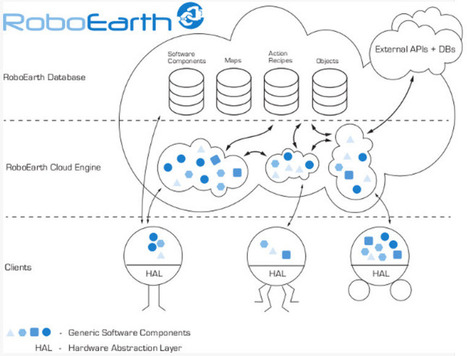European scientists from six institutes and two universities have developed an online platform where robots can learn new skills from each other worldwide — a kind of “Wikipedia for robots.” The objective is to help develop robots better at helping elders with caring and household tasks. “The problem right now is that robots are often developed specifically for one task”, says René van de Molengraft, TU/e researcher and RoboEarth project leader.
“RoboEarth simply lets robots learn new tasks and situations from each other. All their knowledge and experience are shared worldwide on a central, online database.” In addition, some computing and “thinking” tasks can be carried out by the system’s “cloud engine,” he said, “so the robot doesn’t need to have as much computing or battery power on‑board.”
For example, a robot can image a hospital room and upload the resulting map to RoboEarth. Another robot, which doesn’t know the room, can use that map on RoboEarth to locate a glass of water immediately, without having to search for it endlessly. In the same way a task like opening a box of pills can be shared on RoboEarth, so other robots can also do it without having to be programmed for that specific type of box.
RoboEarth is based on four years of research by a team of scientists from six European research institutes (TU/e, Philips, ETH Zürich, TU München and the universities of Zaragoza and Stuttgart).
Robots learn from each other on 'Wiki for robots'
Via
Dr. Stefan Gruenwald,
luiy
 Your new post is loading...
Your new post is loading...
 Your new post is loading...
Your new post is loading...













It is good to see that more and more articles are calling attention to all these concerns.